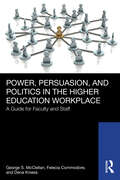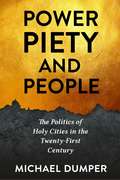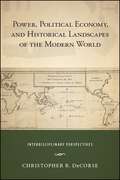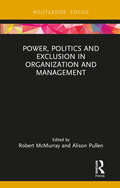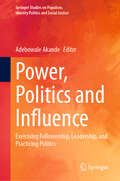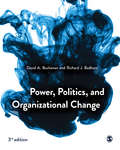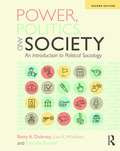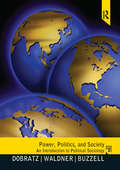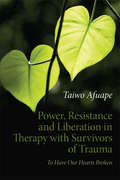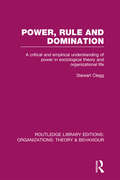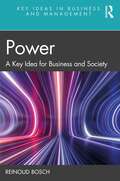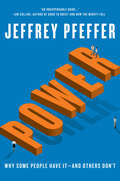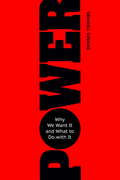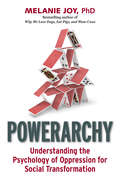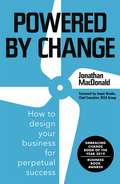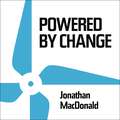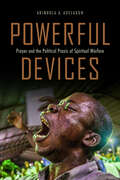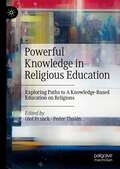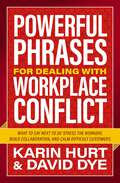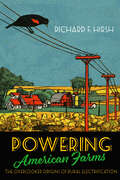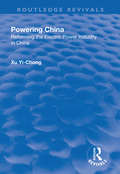- Table View
- List View
Power, Persuasion, and Politics in the Higher Education Workplace: A Guide for Faculty and Staff
by Felecia Commodore George S. McClellan Dena KniessThis invaluable resource supplies foundational knowledge and expert strategies on navigating the workplace dynamics of power, persuasion, and politics across higher education.Despite burnout, compassion fatigue, and questions of privilege and oppression being at the forefront of academia, little if any attention is given to the political aspects of professional practice across the array of campus administrative and academic units. By masterfully leveraging scholarly literature on power, persuasion, and politics with the tried-and-true collegiate expertise of the contributing authors, faculty and staff will develop the knowledge and skills they need to negotiate the pervasive, often intimidating political behavior that dominates the higher education workspace.The ultimate guide to understanding, engaging, and thriving in the campus workplace, this book belongs in the hands of all higher education professionals.
Power, Piety, and People: The Politics of Holy Cities in the Twenty-First Century
by Michael DumperConflicts in cities that have particular religious significance often become intense, protracted, and violent. Why are holy cities so frequently contested, and how can these conflicts be mediated and resolved?In Power, Piety, and People, Michael Dumper explores the causes and consequences of contemporary conflicts in holy cities. He explains how common features of holy cities, such as powerful and autonomous religious hierarchies, income from religious endowments, the presence of sacred sites, and the performance of ritual activities that affect other communities, can combine to create tension.Power, Piety, and People offers five case studies of important disputes, beginning with Jerusalem, often seen as the paradigmatic example of a holy city in conflict. Dumper also discusses Córdoba, where the Islamic history of its Mosque-Cathedral poses challenges to the control exercised by the Roman Catholic Church; Banaras, where competing Muslim and Hindu claims to sacred sites threaten the fragile equilibrium that exists in the city; Lhasa, where the Communist Party of China severely restricts the ancient practice of Tibetan Buddhism; and George Town in Malaysia, a rare example of a city with many different religious communities whose leaders have successfully managed intergroup conflicts. Applying the lessons drawn from these cities to a broader global urban landscape, this book offers scholars and policy makers new insights into a pervasive category of conflict that often appears intractable.
Power, Political Economy, and Historical Landscapes of the Modern World: Interdisciplinary Perspectives (SUNY series, Fernand Braudel Center Studies in Historical Social Science)
by Christopher R. DeCorseThis interdisciplinary volume brings together a richly substantive collection of case studies that examine European-indigene interactions, economic relations, and their materialities in the formation of the modern world. Research has demonstrated the extent and complexity of the varied local economic and political systems, and diverse social formations that predated European contact. These preexisting systems articulated with the expanding European economy and, in doing so, shaped its emergence. Moving beyond the confines of national or Atlantic histories to examine regional systems and their historical trajectories on a global scale, the studies within this volume draw examples from the Caribbean, Mesoamerica, North America, South America, Africa, and South Asia. While the contributions are rooted in substantive studies from different world areas, their overarching aim is to negotiate between global and local frames, revealing how the expanding world-system entangled the non-Western world in global economies, yet did so in ways that were locally articulated, varied and, often, non-European in their expression.
Power, Politics and Exclusion in Organization and Management (Routledge Focus on Women Writers in Organization Studies)
by Alison Pullen Robert McMurrayThere is a long tradition of research on politics, power and exclusion in areas such as sociology, social policy, politics, women’s studies and philosophy. While power has received considerable attention in mainstream management research and teaching, it is rarely considered in terms of politics and exclusion, particularly where the work of women writers is concerned. This second book in the Routledge Series on Women Writers in Organization Studies analyses the ways in which women have theorised and embodied relations of power. Women like Edith Garrud who, trained in the Japanese art of jujutsu, confronted the power of the state to champion feminist politics. Others, such as Beatrice Webb and Alva Myrdal, are shown to have been at the heart of welfare reforms and social justice movements that responded to the worst excesses of industrialisation based on considerations of class and gender. The writing of bell hooks provides a necessarily uncomfortable account of the ways in which imperialism, white supremacy and patriarchy inflict unspoken harm, while Hannah Arendt’s work considers the ways in which different modes of organizing restrict the ability of people to live freely. Taken together, such writings dispel the myth that work or business can be separated from the rest of life, a point driven home by Rosabeth Moss Kanter’s observations on the ways in which power and inequality differentially structure life chances. These writers challenge us to think again about power, politics and exclusion in organizational contexts. They provide provocative thinking, which opens up new avenues for organization theory, practice and social activism. Each woman writer is introduced and analysed by experts in organization studies. Further reading and accessible resources are also identified for those interested in knowing (thinking!) more. This book will be relevant to students, researchers and practitioners with an interest in business and management, organizational studies, critical management studies, gender studies and sociology. Like all the books in this series, it will also be interest to anyone who wants to see, think and act differently.
Power, Politics and Influence: Exercising Followership, Leadership, and Practicing Politics (Springer Studies on Populism, Identity Politics and Social Justice)
by Adebowale AkandeThis book comprehensively explores the foundational principles of power, influence, and organizational politics, presenting actionable approaches for both employees and management to skillfully navigate these intricacies without succumbing to undue incivility, stress, or burnout. Power, as an imperceptible yet influential entity within organizations, steers the trajectory of decisions, behaviors, and the dynamic interplay between leaders and their teams. This book examines leadership theory and practice, offering a unique perspective on leadership styles, behaviors, and traits. In today's dynamic landscape, leadership capability and skill are important across sectors, influencing organizational health, political landscapes, and societal development. The book presents the challenges modern leaders face and how leadership theory can enrich workplace dynamics and beyond. Bridging the gap between academic research and practice, this volume offers guidance for aspiring and experienced leaders alike. From political skill to organizational culture, this book examines leadership from a multidisciplinary perspective. Scholars, students, and researchers of political science, business, management, economics, international relations, and psychology, as well as consultants, policymakers, and leaders interested in a better understanding of effective leadership concepts and the latest research in politics, policy, and participation in any setting, will find this resource invaluable.
Power, Politics, and Organizational Change
by Richard Badham Professor David BuchananOrganization politics can be seen as a game in which players compete for different kinds of territory such as status, power, and influence. In Power, Politics and Organizational Change, David Buchanan and Richard Badham ask: What&’s the relevance of politics to change and innovation? What kind of game is this? What, if any, are the rules? How is the game played? What ethical issues arise? Should one play this game to win, and if so, how? How can you develop political expertise? The third edition has been thoroughly updated and revised. This includes discussion of current trends heightening the importance of developing political will and skill in a post-truth era, the rise of &‘new power&’, the role of &‘BS busting&’, the power of storytelling, and the politics of speaking up.
Power, Politics, and Organizational Change
by Richard Badham Professor David BuchananOrganization politics can be seen as a game in which players compete for different kinds of territory such as status, power, and influence. In Power, Politics and Organizational Change, David Buchanan and Richard Badham ask: What&’s the relevance of politics to change and innovation? What kind of game is this? What, if any, are the rules? How is the game played? What ethical issues arise? Should one play this game to win, and if so, how? How can you develop political expertise? The third edition has been thoroughly updated and revised. This includes discussion of current trends heightening the importance of developing political will and skill in a post-truth era, the rise of &‘new power&’, the role of &‘BS busting&’, the power of storytelling, and the politics of speaking up.
Power, Politics, and Paranoia
by Jan-Willem van Prooijen Paul A. M. van LangePowerful societal leaders - such as politicians and Chief Executives - are frequently met with substantial distrust by the public. But why are people so suspicious of their leaders? One possibility is that 'power corrupts', and therefore people are right in their reservations. Indeed, there are numerous examples of unethical leadership, even at the highest level, as the Watergate and Enron scandals clearly illustrate. Another possibility is that people are unjustifiably paranoid, as underscored by some of the rather far-fetched conspiracy theories that are endorsed by a surprisingly large portion of citizens. Are societal power holders more likely than the average citizen to display unethical behaviour? How do people generally think and feel about politicians? How do paranoia and conspiracy beliefs about societal power holders originate? In this book, prominent scholars address these intriguing questions and illuminate the many facets of the relations between power, politics and paranoia.
Power, Politics, and Society: An Introduction to Political Sociology
by Betty A Dobratz Lisa K Waldner Timothy BuzzellPower, Politics and Society: An Introduction to Political Sociology discusses how sociologists have organized the study of politics into conceptual frameworks, and how each of these frameworks foster a sociological perspective on power and politics in society. This includes discussing how these frameworks can be applied to understanding current issues and other "real life" aspects of politics. This second edition incorporates new material on cultural divides in American politics, emerging roles for the state, the ongoing effects of the Great Recession and recovery, the 2016 election, social media, and the various policies introduced during the Trump administration and how they affect people’s lives.
Power, Politics, and Society: An Introduction to Political Sociology
by Betty DobratzPower, Politics & Society: An Introduction to Political Sociology discusses how sociologists have organized the study of politics into conceptual frameworks, and how each of these frameworks foster a sociological perspective on power and politics in society. This includes discussing how these frameworks can be applied to understanding current issues and other "real life" aspects of politics. The authors connect with students by engaging them in activities where they complete their own applications of theory, hypothesis testing, and forms of inquiry.
Power, Powerlessness and Addiction
by Jim OrfordAddiction exercises enormous power over all those who are touched by it. This book argues that power and powerlessness have been neglected in addiction studies and that they are a unifying theme that brings together different areas of research from the field including the disempowering nature of addiction; effects on family, community and the workplace; epidemiological and ethnographic work; studies of the legal and illegal supply, and theories of treatment and change. Examples of alcohol, drug and gambling addiction are used to discuss the evidence that addiction is most disempowering where social resources to resist it are weakest; the ways in which the dominant discourses about addictive behaviour encourage the attributing of responsibility for addiction to individuals and divert attention from the powerful who benefit from addiction; and the ways in which the voices of those whose interests are least well served by addiction are silenced.
Power, Resistance and Liberation in Therapy with Survivors of Trauma: To Have Our Hearts Broken
by Taiwo AfuapeThis book offers reflections on how liberation might be experienced by clients as a result of the therapeutic relationship. It explores how power and resistance might be most effectively and ethically understood and utilised in clinical practice with survivors of trauma. Power, Resistance and Liberation in Therapy with Survivors of Trauma draws together narrative therapy, Coordinated Management of Meaning (CMM) and liberation psychology approaches. It critically reviews each approach and demonstrates what each contributes to the other as well as how to draw them together in a coherent way. The book presents: an original take on CMM through the lenses of power and resistance a new way of thinking about resistance in life and therapy, using the metaphor of creativity numerous case examples to support strong theory-practice links. Through the exploration of power, resistance and liberation in therapy, this book presents innovative ways of conceptualising these issues. As such it will be of interest to anyone in the mental health fields of therapy, counselling, social work or critical psychology, regardless of their preferred model. It will also appeal to those interested in a socio-political contextual analysis of complex human experience.
Power, Rule and Domination: A Critical and Empirical Understanding of Power in Sociological Theory and Organizational Life (Routledge Library Editions: Organizations)
by Stewart CleggThis volume presents a critical analysis of sociological theorizing and power which enables the reader to grasp fully the nature of power, rule and domination in organizational life. By making use of the discussions he recorded at a construction site, the author brings the reader into contact with the everyday social world in which he locates his analysis of power and authority at both a structural and phenomenological level. This analysis is complemented by the author’s review of the literature on ‘theorizing’ by writers such as Wittgenstein, Blum, McHugh, Phillips and Cicourel; his examination of the ‘community power debate’ between authors such as Bachrach and Baratz and Dahl; and a survey of the literature on power in its organizational aspects by Weber, Simmel and the more contemporary work of Hickson.
Power: A Key Idea for Business and Society (Key Ideas in Business and Management)
by Reinoud BoschPower plays a central role in business and management. But what is power exactly, and what are key elements of this concept? Defining power as relative ability, this book discusses structures of power, individual power, the exercise of power, strategy, and collective power. While discussing these key components, ideas of important thinkers about power, from Plato to Foucault, Weber to Lukes, Machiavelli to Kahneman, Sun to Kotter, and Barnard to Clegg, are discussed and interpretively categorized into a toolbox of conceptual elements – what Blumer referred to as sensitizing concepts. This toolbox of sensitizing concepts allows the selection of those elements of the concept of power that provide the most constructive and effective practical understanding in particular situations. The core message behind the discussion is that knowledge of key components of the concept of power is empowering. It is empowering to learn about aspects of structures of power, individual power, the exercise of power, strategy, and collective power. Understanding such conceptual components empowers students, researchers, practitioners, and other readers to use their understanding in interpreting, theorizing about, and dealing with the complexities of power in their particular situations – without tying them to any preconceived general theories about power.
Power: How to Get It, How to Use It
by Michael KordaThe purpose of this book is to show you how to use, recognize and live with power, and to convince you that the world you live in is a challenge and a game, and that a sense of power--your power--is at the core of it.
Power: Why Some People Have It -- and Others Don't
by Jeffrey PfefferIn this crowning achievement, one of the greatest minds in management theory reveals how to succeed and wield power in the real world. <P><P> Over decades of consulting with corporations and teaching MBA students the nuances of organizational power, Jeffrey Pfeffer has watched numerous people suffer career reversals even as others prevail despite the odds. <P><P> Our most common mistake is not having a realistic understanding of what makes some people more successful than others. By believing that life is fair, we tend to subscribe to the "just-world phenomenon," which leaves us unprepared for the challenges and competition of the real world. <P><P> Now Pfeffer brings decades of his incredible insights to a wider audience. Brimming with counterintuitive advice, numerous examples from various countries, and surprising findings based on his research, this groundbreaking guide reveals the strategies and tactics that separate the winners from the losers. Power, he argues, is a force that can be used and harnessed not only for individual gain but also for the benefit of organizations and society. Power, however, is not something that can be learned from those in charge-their advice often puts a rosy spin on their ascent and focuses on what should have worked, rather than what actually did. Instead, Pfeffer reveals the true paths to power and career success. Iconoclastic and grounded in the realpolitik of human interaction, Power is an essential organizational survival manual and a new standard in the field of leadership and management.
Power: Why We Want It and What to Do with It
by Dennis ToombsThis book explores human behavior in terms of power in all its manifestations across a wide spectrum. The author examines the subtle dynamics of power in interpersonal relationships as well as its overarching influence in large institutions such as governments, nations, and the financial centers of our global economy. By using this single conceptual lens, he demonstrates how abundant and diverse our power sources are, how to find and develop them to unleash our hidden potential, and how to help others accomplish the same.What are the three (or four) greatest sources of individual power? How do we use power passively and aggressively in relationships? Why does power tend to corrupt? What influence does government have on the distribution of wealth? In what ways have globalization and technology changed our national economies, corporations, and governments? How can we promote the common good for ourselves and society?These questions and more are illuminated through the author's insightful focus on power broadly defined. After reading this book, you'll never see yourself or the world again in quite the same way.From the Trade Paperback edition.
Powerarchy: Understanding the Psychology of Oppression for Social Transformation
by Melanie JoyHarvard-educated psychologist and bestselling author Melanie Joy exposes the psychology that underlies all forms of oppression and abuse and the belief system that gives rise to this psychology—which she calls powerarchy. Melanie Joy had long been curious as to why people who were opposed to one or more forms of oppression—such as racism, sexism, speciesism, and so forth—often stayed mired in many others. She also wondered why people who were working toward social justice sometimes engaged in interpersonal dynamics that were unjust. Or why people who valued freedom and democracy might nevertheless vote and act against these values. Where was the disconnect?In this thought-provoking analysis, Joy explains how we've all been deeply conditioned by the invisible system of powerarchy to believe in a hierarchy of moral worth—to view some individuals and groups as either more or less worthy of moral consideration—and to treat them accordingly. Powerarchy conditions us to engage in power dynamics that violate integrity and harm dignity, and it creates unjust power imbalances among social groups and between individuals. Joy describes how powerarchies—both social and interpersonal—perpetuate themselves through cognitive distortions, such as denial and justification; narratives that reinforce the belief in a hierarchy of moral worth; and privileges that are granted to some and not others. She also provides tools for transformation. By illuminating powerarchy and the psychology it creates, Joy helps us to work more fully toward transformation for ourselves, others, and our world.
Powered by Change: How to design your business for perpetual success - THE SUNDAY TIMES BUSINESS BESTSELLER
by Jonathan MacDonald**THE SUNDAY TIMES BUSINESS BESTSELLER**Voted the EMBRACING CHANGE BOOK OF THE YEAR at the BUSINESS BOOK AWARDSWhen the winds of change blow, some build a wall and others build a windmillIn a business environment where change is the only constant, the stark reality is that it has never been harder to see what's happening around us, interpret information efficiently or develop successful strategies. This is down to both the increasing speed of change and the prevalent mindset about change, where change is seen as the enemy.Powered by Change presents a radical new methodology for using change as a fuelling mechanism to generate outstanding business success: the Windmill Theory.Power your businessThe Windmill Theory enables leaders and organisations to think and act in a way that capitalises on a constantly changing environment. Constructed of four blades working in perpetual harmony with one another, it creates an empowered business that turns the winds of change into business success.Filled with examples and stories from around the world, from global corporates to start-up ventures, Powered by Change delivers some astonishing insights and clear, actionable steps to achieve the ultimate competitive advantage.Use this book to fuel your business for the future.
Powered by Change: How to design your business for perpetual success - THE SUNDAY TIMES BUSINESS BESTSELLER
by Jonathan MacDonald**THE SUNDAY TIMES BUSINESS BESTSELLER**There's an ancient proverb that states, "When the winds of change are blowing, some build a wall and others build a windmill". In a business environment where change is the only constant, the stark reality is that it has never been harder to see what's happening around us, interpret information efficiently or develop successful strategies. This is down to both the increasing speed of change and the prevalent mindset about change, where change is seen as the enemy. Powered by Change presents a radical new methodology for using change as a fuelling mechanism to generate outstanding business success: the Windmill Theory. Power your businessThe Windmill Theory enables leaders and organisations to think and act in a way that capitalises on a constantly changing environment. Constructed of four blades working in perpetual harmony with one another, it creates an empowered business that turns the winds of change into business success. Filled with examples and stories from around the world, from global corporates to start-up ventures, Powered by Change delivers some astonishing insights and clear, actionable steps to achieve the ultimate competitive advantage.Use this book to fuel your business for the future.(P)2018 Hodder & Stoughton Limited
Powerful Devices: Prayer and the Political Praxis of Spiritual Warfare
by Abimbola Adunni AdelakunPowerful Devices studies spiritual warfare performances as an apparatus for disestablishing structures of power and knowledge, and establishing righteousness in their stead. Drawing on performance studies’ emphasis on radicality and breaking of social norms as devices of social transformation, the book demonstrates how Christian groups with dominant cultural power but who perceive themselves as embattled wield the ideas of performance activism. Combining religious studies with ethnography, Powerful Devices explores Nigerian Pentecostals and US Evangelicals’ praxis of transnational spiritual warfare. By closely studying spiritual warfare prayers as a “device,” Powerful Devices shows how the rituals of prayer enable an apprehension of time, paradigms of self-enhancement, and the subversion of politics and authority. A critical intervention, Powerful Devices explores charismatic Christianity’s relationship to science and secular authority, technology and temporality, neoliberalism, and reactionary ideology.
Powerful Knowledge in Religious Education: Exploring Paths to A Knowledge-Based Education on Religions
by Olof Franck Peder ThalénThis book unites and explores different approaches to understand and develop knowledge-based religious education. While the importance of methodological issues in RE is understood and acknowledged, the editors and contributors interrogate what kind of knowledge should be explored, how this knowledge is defined and what the consequences would be. Subsequently, the book focuses on the concept of powerful knowledge which transcends students' everyday experiences, and how it can be incorporated into the RE curriculum. Drawing together international research from RE teaching and learning, the book explores various paths to integrate a truly knowledge-based religious education. The book will appeal to students and scholars of religious education, sociology of education and the philosophy of religion.
Powerful Phrases for Dealing with Workplace Conflict: What to Say Next to De-stress the Workday, Build Collaboration, and Calm Difficult Customers
by Karin Hurt David DyeAn essential guide to master any workplace conflict with confidence and ease, have less drama, better results, and thrive at work.In many workplaces today, workplace conflict is an escalating issue. The shift to remote work and hybrid teams has left many people longing for deeper human connection. On top of this, add a younger generation clamoring for more feedback and impatient for change, steady advances in technology that can feel threatening to job security, or people reexamining priorities and quietly quitting. Take the increase in anxiety, stress, and depression, mix in the loss of human relationships, and you get less tolerance and understanding leading, ultimately, to more unresolved workplace conflict. Powerful Phrases for Dealing with Workplace Conflict is an essential resource for all employees (and their managers) who are looking for help on how to navigate frequent workplace conflicts, including with their boss and other difficult people, so they can rebuild trust, collaboration, and ultimately enjoy more influence at work. Leadership and workplace culture experts Karin Hurt and David Dye share practical and easy-to-follow tactics such as:Over 300 actual phrases you can use to deescalate common workplace conflict situations, build trust, and make better decisions.Clear examples and explanations of how phrasing will improve interactions.Critical communication tools to ensure workplace issues are addressed before they fester and become more difficult to manage.Findings, real-world cases, and inspiring stories from the World Workplace Conflict and Collaboration Survey of 5000+ people in more than 45 countries conducted by the authors.
Powering American Farms: The Overlooked Origins of Rural Electrification
by Richard F. HirshThe untold story of the power industry's efforts to electrify growing numbers of farms in the years before the creation of Depression-era government programs.Even after decades of retelling, the story of rural electrification in the United States remains dramatic and affecting. As textbooks and popular histories inform us, farmers obtained electric service only because a compassionate federal government established the Tennessee Valley Authority and the Rural Electrification Administration (REA) during the Great Depression of the 1930s. The agencies' success in raising the standard of living for millions of Americans contrasted with the failure of the greedy big-city utility companies, which showed little interest in the apparently unprofitable nonurban market. Traditional accounts often describe the nation's population as split in two, separated by access to a magical form of energy: just past cities' limits, a bleak, preindustrial class of citizens endured, literally in near darkness at night and envious of their urban cousins, who enjoyed electrically operated lights, refrigerators, radios, and labor-saving appliances.In Powering American Farms, Richard F. Hirsh challenges the notion that electric utilities neglected rural customers in the years before government intervention. Drawing on previously unexamined resources, Hirsh demonstrates that power firms quadrupled the number of farms obtaining electricity in the years between 1923 and 1933, for example. Though not all corporate managers thought much of the farm business, a cadre of rural electrification advocates established the knowledge base and social infrastructure upon which New Deal organizations later capitalized. The book also suggests that the conventional storyline of rural electrification remains popular because it contains a colorful hero, President Franklin D. Roosevelt, and villainous utility magnates, such as Samuel Insull, who make for an engaging—but distorted—narrative.Hirsh describes the evolution of power company managers' thinking in the 1920s and early 1930s—from believing that rural electrification made no economic sense to realizing that serving farmers could mitigate industry-wide problems. This transformation occurred as agricultural engineers in land-grant universities, supported by utilities, demonstrated productive electrical technologies that yielded healthy profits to farmers and companies alike. Gaining confidence in the value of rural electrification, private firms strung wires to more farms than did the REA until 1950, a fact conveniently omitted in conventional accounts. Powering American Farms will interest academic and lay readers of New Deal history, the history of technology, and revisionist historiography.
Powering China: Reforming the Electric Power Industry in China (Routledge Revivals)
by Xu Yi-chongThis title was first published in 2002: This study of the Chinese electric power industry examines the ownership and the restructuring of the industry. The reform of the electric power industry is also seen as part of the wider economic development that has been taking place in China, thus providing fresh perspectives on the changes taking place in both the economy and society more generally. Presenting a wealth of extensive research on the subject, the book elucidates the power struggle between political and bureaucratic elite and explains the sensitive and volatile relationship between the central and provincial government against an increasingly complex global background.
